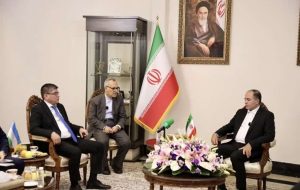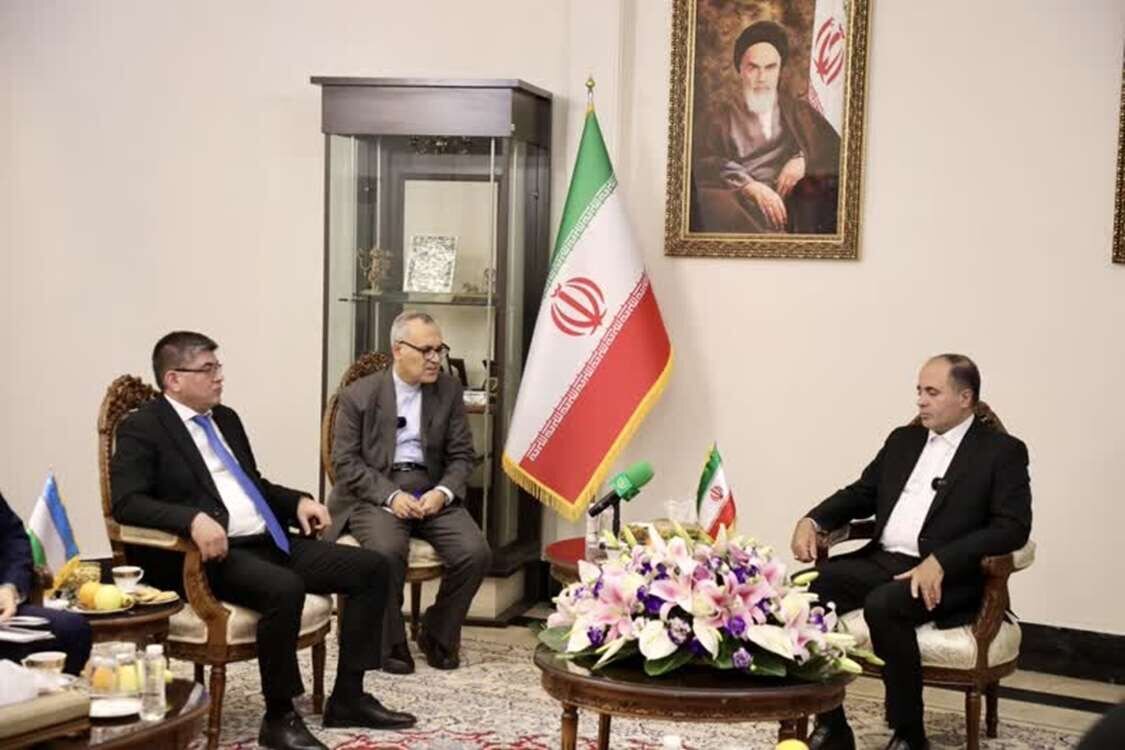Iran, Uzbekistan to enhance agricultural cooperation
TEHRAN – Iran’s Agriculture Minister Gholamreza Nouri Ghezeljeh expressed the country’s readiness to expand agricultural cooperation with Uzbekistan, in a meeting with the Ambassador of Uzbekistan in Tehran Nasriev Fariddin Badriddinovich on Thursday. In the meeting, Nouri Ghezeljeh highlighted the Islamic Republic’s capacities and capabilities for providing Uzbekistan with engineering services, training, and research in


TEHRAN – Iran’s Agriculture Minister Gholamreza Nouri Ghezeljeh expressed the country’s readiness to expand agricultural cooperation with Uzbekistan, in a meeting with the Ambassador of Uzbekistan in Tehran Nasriev Fariddin Badriddinovich on Thursday.
In the meeting, Nouri Ghezeljeh highlighted the Islamic Republic’s capacities and capabilities for providing Uzbekistan with engineering services, training, and research in the fields of livestock breeding and drip irrigation.
Praising the initiative of the presidents of the two countries in developing joint cooperation, Nouri Ghezeljeh stated that given the shared cultural, religious, and historical interests between the two countries, the development of economic relations and the increase of trade exchanges are of special importance.
He referred to Iran’s agricultural capabilities in technology development and research, adding that the construction of low-cost greenhouses, the establishment of dry and cold storage warehouses for agricultural products, processing, and complementary industries, as well as technology for disinfecting agricultural products, are among the services that the Islamic Republic can offer.
According to the Iranian official, economic exchanges between the two countries do not align with the capacities, histories, and interests of both nations, and the targeted figure of $2 billion set in the meeting of the Iranian and Uzbek presidents will serve as a prelude to upgrade economic relations between Tehran and Tashkent.
The Uzbek ambassador, for his part, expressed his country’s readiness to collaborate with Iran in seven agricultural areas.
According to the official, cooperation between the two countries would include modern irrigation, planting drought-resistant crops like pistachios, creating modern greenhouses, producing agricultural equipment and tools, collaboration in poultry and turkey meat production, animal feed, as well as conducting scientific research and exchanging experiences in livestock and aquaculture.
On October 20, an official with Iran’s Trade Promotion Organization (TPO) said that Iran and Uzbekistan plan to increase their annual trade exchanges to $5.0 billion and the two sides have reached a primary agreement to sign a preferential trade agreement (PTA) soon.
Akbar Godari, the head of TPO’s Central Asia, Caucasus, and Russia Office, referred to the economic agreements reached between the two countries during the visit of Uzbekistan’s Minister of Investment, Industry, and Trade to Iran, and said: “The efforts and desire of the two countries to develop trade exchanges have been formed, therefore the 16th Joint Economic Committee meeting of Iran and Uzbekistan will be hosted by Iran in March to increase trade exchanges.”
Also, discussions have been held regarding the details of a joint investment fund between the two countries that will be established shortly, Godari added.
Regarding the initial agreements for the signing of a preferential trade agreement between Iran and Uzbekistan, the official said: “Last year, Abbas Ali-Abadi, the Iranian Minister of Industry, Mining and Trade at the time, traveled to Uzbekistan and discussed with his counterpart in Uzbekistan the conclusion of a preferential trade agreement. For more than six months, the two countries discussed various aspects of the agreement including the certificate of origin document, and reviewed and resolved the challenges ahead, and now preliminary agreements have been made to sign this agreement.”
He underlined the role of the Trade Promotion Organization of Iran in facilitating the trade relations between Iran and Uzbekistan, saying: “The list of the goods that are subject to preferential tariffs has been determined, and the Trade Promotion Organization of Iran is trying to increase the number of items that are subject to preferential tariffs in a short period.”
On September 19, Uzbekistan capital Tashkent hosted an Iran-Uzbekistan business forum, in which officials and businesspeople from the two sides exchanged views on ways of expanding mutual trade ties, the portal of Iran Chamber of Commerce, Industries, Mines and Agriculture (ICCIMA) reported.
Speaking at the forum, ICCIMA Head Samad Hassanzadeh called for more enhanced exchanges between Iran and Uzbekistan.
Hassanzadeh, who visited Uzbekistan on top of a business delegation, underlined the development of new strategies to strengthen economic relations as one of the goals of the business forum and emphasized the need to take serious steps in this regard from both sides.
“I would like to stress that in the new atmosphere of cooperation between the two countries, it is necessary to take serious steps to expand relations. Taking advantage of existing potential capacities and opportunities can guarantee long-term economic relations between the economic operators of Iran and Uzbekistan,” the ICCIMA head said.
Emphasizing the cultural affinities and friendship between the two nations and the interest for cooperation between the two nations and the two governments, he continued: “As in recent years, there have been three visits at the presidential levels between the two countries.”
“Currently, the establishment of the new government in Iran with the slogan of removing obstacles to foreign trade promises a new chapter in Iran’s economic cooperation, especially with regional countries,” the official added.
Elsewhere in his remarks, Hassanzadeh noted that achieving economic goals between the two countries requires providing the necessary infrastructure including banking and monetary, transportation, development of customs, adjustment of trade tariffs, and exchange of technical knowledge.
“Currently, our primary goal for this year is to increase our current $500 million trades to $1.0 billion, and we hope to achieve this by the end of the year,” he said, adding that “Countless economic capacities are available for the economic operators of the two countries, and this enthusiasm that is seen today for the cooperation of companies, needs to be taken very seriously by the policy makers and authorities of the two countries.”
EF/MA
Photo: Iran’s Agriculture Minister Gholamreza Nouri Ghezeljeh (R) meet with Uzbek Ambassador in Tehran Nasriev Fariddin Badriddinovich (L) on Thursday.
